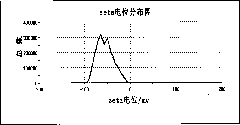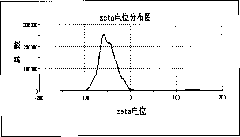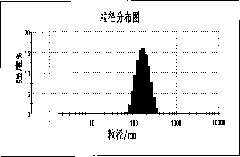Preparation method of aqueous polyester polyol dispersoid
A dispersion and polyester technology, applied in polyurea/polyurethane coatings, coatings, etc., can solve problems such as high resin acid value, increased VOC content, stability problems, etc., achieve high gloss, improve mechanical properties and durability High stability and high effect
- Summary
- Abstract
- Description
- Claims
- Application Information
AI Technical Summary
Problems solved by technology
Method used
Image
Examples
Embodiment 1
[0072] (1) Preparation of polyester intermediate: 81g neopentyl glycol, 70g isophthalic acid-5-sodium sulfonate, 0.17g Fascat 4100 and 20g deionized water are added to a mixture with stirring rod, condensing device, thermocouple and In a four-neck round-bottomed flask with a nitrogen inlet, pass nitrogen gas, raise the temperature to 90°C while stirring, and keep the temperature for half an hour. Then heat at 100-160°C for 2 hours, 160-200°C for 2 hours, heat at 210°C at a constant temperature until the acid value is less than 2mgKOH / g, then cool down, pour it into a mortar while it is hot, grind it to powder, and store it under dry conditions ;
[0073] (2) Preparation of polyester polyol aqueous dispersion: add the polyester intermediate 16.9g of embodiment 1 in the four-necked round-bottomed flask that has stirrer, condensation pipe, water trap, thermocouple and nitrogen inlet, Neopentyl glycol 43.6g, isophthalic acid 46.9g, trimethylolpropane 7.4g, and acid catalyst Fasca...
Embodiment 2
[0092] (1) Preparation of polyester intermediate: with the step (1) of embodiment 1;
[0093] (2) Preparation of polyester polyol aqueous dispersion: add the polyester intermediate prepared in step (1) in a four-necked round bottom flask with agitator, condenser, water separator, thermocouple and nitrogen inlet 13.5g, neopentyl glycol 34.8g, terephthalic acid 37.5g, trimethylolpropane 5.9g, and acid catalyst Fascat 41000.7g, and nitrogen was passed. Heat at 120°C, 140°C, and 160°C for 0.5 hour, 180°C for 1 hour, and raise the temperature to 220°C for constant temperature heating. When the solution became transparent, the temperature was lowered to 120°C, 28g of adipic acid was added, the temperature was slowly raised to 180°C, and the remaining 5.9g of trimethylolpropane was added. Slowly raise the temperature to 220°C and heat at a constant temperature until the acid value is less than 10mgKOH / g. Cool down the resin to 80°C, slowly add 120g of deionized water, stir and disp...
Embodiment 3
[0113] Embodiment 3: the preparation method of polyester polyol aqueous dispersion has the following steps:
[0114] (1) will have -SO 3 The dicarboxylic acid of the M group reacts with the dihydric alcohol to prepare the polyester intermediate: add -SO in the reactor 3 M-group dicarboxylic acid, glycol, catalyst, deionized water, introduce nitrogen and raise the temperature, control the reaction temperature 140 ° C ~ 160 ° C, the reaction time is about 9 hours; when the acid value of the mixed material in the reactor is 0.6, Stop the reaction to obtain a polyester intermediate; the amount of each component is: dibasic alcohol and -SO 3 The molar ratio of the dicarboxylic acid of the M group is 3:1, and the consumption of the catalyst is 0.6wt% of the total amount of alcohol and acid; 20.7wt% of deionized water.
[0115] (2) Reaction of polyester intermediate with polycarboxylic acid and polyhydric alcohol to synthesize resin with polyester polyol: add dihydric alcohol, trih...
PUM
| Property | Measurement | Unit |
|---|---|---|
| Hydroxyl value | aaaaa | aaaaa |
| Acid value | aaaaa | aaaaa |
| Viscosity | aaaaa | aaaaa |
Abstract
Description
Claims
Application Information
 Login to View More
Login to View More - R&D
- Intellectual Property
- Life Sciences
- Materials
- Tech Scout
- Unparalleled Data Quality
- Higher Quality Content
- 60% Fewer Hallucinations
Browse by: Latest US Patents, China's latest patents, Technical Efficacy Thesaurus, Application Domain, Technology Topic, Popular Technical Reports.
© 2025 PatSnap. All rights reserved.Legal|Privacy policy|Modern Slavery Act Transparency Statement|Sitemap|About US| Contact US: help@patsnap.com



